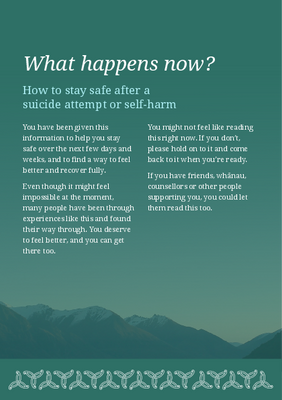What happens now?

Booklet giving information about how to stay safe after a suicide attempt or self-harm event.
The full resource:
NOTE: To order this free resource, please visit the Mental Health Foundation's online shop.
What happens now?
How to stay safe after a suicide attempt or self-harm
You have been given this information to help you stay safe over the next few days and weeks, and to find a way to feel better and recover fully.
Even though it might feel impossible at the moment, many people have been through experiences like this and found their way through. You deserve to feel better, and you can get there too.
You might not feel like reading this right now. If you don’t, please hold on to it and come back to it when you’re ready. If you have friends, whānau, counsellors or other people supporting you, you could letm them read this too.
1. Make a plan to keep yourself safe
When things feel really bad, it can help to have a list of things you can do to distract yourself or make yourself feel a bit better.
Take some time to fill in My own survival plan with a doctor or support person, or by yourself (order details are below).
This plan asks you to think about what you need to stay safe, your reasons for staying alive, what you can do and who can help.
2. Find people or services you can talk to
It can feel much worse if no one knows what you are going through or how you feel. You don’t need to deal with this alone. Talking can really help.
Think about who you could talk to – these could be friends, family or whānau members, medical professionals or a free 24/7 helpline. Make a list on the next page so it’s there when you need it.
People will react in different ways – if the first person you talk to doesn’t listen or support you, try someone else.
3. Remove risks from your environment
Get rid of things that you might use to hurt yourself – move them out of the house or ask someone to lock them away.
This could include getting rid of alcohol, drugs and extra medicines. It might also mean going somewhere to recover, away from people or places that hurt or upset you. Ask your doctor or support person if they can help you to find a safe place, like a respite service.
4. Let other people help you
Surround yourself with people you trust and enjoy being with, and try to accept their support. Go and see your kaumātua or kuia, or someone who knows you well.
Keep seeing your doctor, counsellor or health professionals. You could ask someone to help you make appointments, or go with you.
If you’re on new medicines, keep taking them and remember that they will take time to start working. Talk to your doctor about any side-effects you experience, especially if you feel worse.
5. Give yourself a chance
Try to be kind to yourself. You deserve support. It’s okay to take the time you need before returning to work, school or other roles.
You only have to cope one day or one hour at a time. It might be hard, but try to hold on to hope, and connect with people who help you feel hopeful. You won’t always feel this way.
Who can I talk to?
If things are at crisis point for you right now, or you don’t feel you can cope or stay alive by yourself, call your local mental health crisis team or go to the emergency department at your nearest hospital. Try to find someone to stay with you until help arrives.
If you’re in danger right now, please call 111
Write down the names and contacts for people you can talk to.
- Friends, whānau or other support people:
- Your doctor
- Other people (e.g. counsellor, peer support worker)
Free, anonymous 24/7 helplines
- Need to talk? Free call or text 1737 to talk to a trained counsellor
- Lifeline: 0800 543 354
- Youthline: 0800 376 633, free txt 234 or email talk@youthline.co.nz
- Samaritans: 0800 726 666
What are some small things I can do by myself to help me cope?
- Go for a walk
- Practice some waiata
- Do breathing exercises
- Have a coffee
- Listen to calm music
“I didn’t know that life could be as good as it is. Sometimes I cry with gratitude at how much better it is now.”
– Sam, 26
You can get free copies of resources at www.mentalhealth.org.nz/get-help